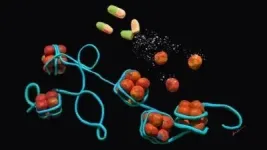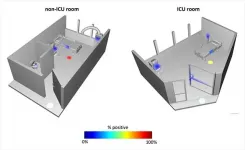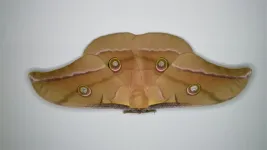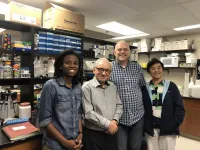Curtin study finds aspirin takes the headache out of restoration
2021-06-09
(Press-News.org) New Curtin research has shown how a readily available, cheap and safe-to-use product found in the medicine cabinet of most homes could be the key to better ecological restoration practices with major benefits for the environment and agriculture.
The study revealed that aspirin, which naturally occurs in the bark of the willow tree and other plants, can improve the survival of grass species important for ecological restoration and sustainable pasture when applied in a seed coating.
Lead researcher Dr Simone Pedrini from the ARC Centre for Mine Site Restoration in Curtin's School of Molecular and Life Sciences, said salicylic acid has been used for its medicinal properties for more than 4000 years and its modern synthetic version, acetylsalicylic acid, or aspirin, is one of the most widely used medications in the world.
"Our research found that aspirin can do more than just ease a headache; it can also help restore degraded land and ecosystems and establish sustainable pastures through improving plant growth and survival," Dr Pedrini said.
"This study was performed on native perennial grasses and showed that applying very low concentrations of salicylic acid to the seed can improve plant survival and therefore its effectiveness in reaching restoration goals.
"Salicylic acid was already known for its ability to improve stress resistance for plants such as tomatoes, making it useful for the agricultural industry, but its effect on native species and potential to aid landscape restoration was still unknown."
Research team member and Director of the ARC Centre for Mine Site Restoration, John Curtin Distinguished Professor Kingsley Dixon said salicylic acid was applied to the seeds of the native grass species using a technology called seed coating, perfected by Curtin University researchers, that allows seed shape and size to be modified, improving seeding efficiency, and can be used to carry growth benefiting compounds.
"This is the first study to deliver aspirin via coating on native species which means the technology can be scaled up for improving restoration targets such as the UN Decade on Ecosystem Restoration to be launched on 5 June 2021," Professor Dixon said.
"Further research is now needed to test salicylic acid as a coating in other wild species to improve native plant resistance to drought, extreme temperatures, salinity, pathogens, and herbicides.
"Moreover, coating with salicylic acid in combination with other beneficial compounds should be tested on a broader array of plant species used in restoration, as their combined impact on seed germination, emergence, growth and plant establishment could improve the successful deployment of native seed onto degraded landscapes, ultimately allowing for a more efficient seed-based restoration."
The full paper, 'Seed encrusting with salicylic acid: a novel approach to improve establishment of grass species in ecological restoration' will be published in PLOS ONE.
INFORMATION:
ELSE PRESS RELEASES FROM THIS DATE:
2021-06-09
Our genetic material is stored in our cells in a specific way to make the meter-long DNA molecule fit into the tiny cell nucleus of each body cell. An international team of researchers at the Max Planck Institute for Biology of Ageing, the CECAD Cluster of Excellence in Ageing research at the University of Cologne, the University College London and the University of Michigan have now been able to show that rapamycin, a well-known anti-ageing candidate, targets gut cells specifically to alter the way of DNA storage inside these cells, and thereby promotes gut health and longevity. This effect has been observed in flies and mice. The researchers believe this finding will open up new possibilities for targeted therapeutic interventions ...
2021-06-09
BOSTON - A new analysis by researchers at Massachusetts General Hospital (MGH) offers a novel perspective on the disproportionate impact that COVID-19 has had on people of color, low-income populations, and other structurally disadvantaged groups. Their findings, published in a research letter to the END ...
2021-06-09
For decades, physicians and dieticians have urged people to limit their intake of high fat foods, citing links to poor health outcomes and some of the leading causes of death in the U.S., such as diabetes, heart disease and cancer.
According to the Centers for Disease Control and Prevention, dietary components high in saturated fats such as red meat are thought to be risk factors for colon cancer. Diet is thought to strongly influence the risk of colorectal cancer, and changes in food habits might reduce up to 70% of this cancer burden.
Other known epidemiological risk factors are family history, inflammatory bowel disease, ...
2021-06-09
Watching what was happening around the world in early 2020, University of California San Diego School of Medicine researchers knew their region would likely soon be hit with a wave of patients with COVID-19, the infection caused by the coronavirus SARS-CoV-2. They wondered how the virus persists on surfaces, particularly in hospitals, and they knew they had only a small window of time to get started if they wanted to capture a snapshot of the "before" situation -- before patients with the infection were admitted.
After a call late one Sunday night, a team assembled in the ...
2021-06-09
MELVILLE, N.Y., June 9, 2021 -- In the evolutionary battle between hunter and hunted, sound plays an integral part in the success or failure of the hunt. In the case of bats vs. moths, the insects are using acoustics against their winged foes.
During the 180th Meeting of the Acoustical Society of America, which will be held virtually June 8-10, Thomas Neil, from the University of Bristol, will discuss how moth wings have evolved in composition and structure to help them create anti-bat defenses. The session, "Moth wings are acoustic metamaterials," will take place Wednesday, June 9, at 1 p.m. Eastern U.S.
Nocturnal moths ...
2021-06-09
MELVILLE, N.Y., June 9, 2021 -- The prolonged impact of the COVID-19 pandemic and the interaction restrictions created widespread lockdown fatigue and increased social tension in multiunit housing. But small improvements in quality-of-life routines may help people cope with the health restrictions better than they previously could.
During the 180th Meeting of the Acoustical Society of America, which will be held virtually June 8-10, Braxton Boren, from American University, will discuss noise prevention techniques and the use of alterative acoustic stimulation to help those who find themselves in pandemic-related lockdowns. The session, "The Soundscape of Quarantine," will take place Wednesday, June 9, at 1:45 p.m. Eastern U.S.
While there have been studies about ...
2021-06-09
The SARS-CoV-2 papain-like protease (PLpro) plays an essential role in processing viral proteins needed for replication. In addition, the enzyme can cut and inactivate some human proteins important for an immune response. Now, researchers reporting in ACS Infectious Diseases have found other targets of PLpro in the human proteome, including proteins involved in cardiovascular function, blood clotting and inflammation, suggesting a link between the inactivation of these proteins and COVID-19 symptoms.
Viruses like SARS-CoV-2 make multiple proteins as one long "polyprotein." Viral enzymes called proteases recognize specific amino acid sequences in this polyprotein and cut them to release individual proteins. ...
2021-06-09
A cell-penetrating peptide developed by researchers at Vanderbilt University Medical Center can prevent, in an animal model, the often-fatal septic shock that can result from bacterial and viral infections.
Their findings, published this week in Scientific Reports, could lead to a way to protect patients at highest risk for severe complications and death from out-of-control inflammatory responses to microbial infections, including COVID-19.
"Life-threatening microbial inflammation hits harder (in) patients with metabolic syndrome, a condition afflicting millions of people in the United States and worldwide," said the paper's corresponding author, Jacek Hawiger, MD, PhD, the Louise B. McGavock Chair in Medicine and Distinguished Professor of Medicine ...
2021-06-09
BRIEFING NOTE: Researchers will announce these results at the 238th AAS meeting on Wednesday, June 9 at 12:15 p.m. E.D.T. Press registration details can be found here: https://aas.org/meetings/aas238/press. Interested journalists can also tune in to AAS briefings streamed live at: https://www.youtube.com/c/AASPressOffice. Please note that you will not be able to ask questions via YouTube; to ask questions, you'll need to register for the meeting and join the briefings via Zoom. Recordings will be archived on the AAS Press Office YouTube channel afterward.
To catch sight of a fast radio burst is to be extremely lucky in where and when you point your radio dish. Fast radio bursts, or FRBs, are oddly bright flashes of light, registering ...
2021-06-09
OAKLAND, Calif. -- The significant declines in heart attack hospitalizations and emergency care for possible strokes seen in Northern California at the beginning of the COVID-19 pandemic were not seen in subsequent surges, new research from Kaiser Permanente shows.
The study, published June 2 in JAMA, suggests public health campaigns that encouraged people to seek care if they were experiencing signs or symptoms of a stroke or heart attack were effective.
"In May 2020, we reported that, in the early months of the pandemic, the weekly number of patients admitted to our hospitals for a heart attack fell to nearly half of what would be expected," said the study's lead author Matthew ...
LAST 30 PRESS RELEASES:
[Press-News.org] Curtin study finds aspirin takes the headache out of restoration



